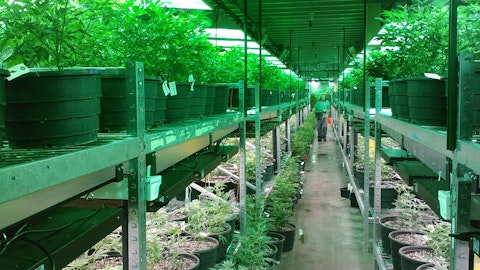Ty Collin: Okay, great. Thanks for that. And then maybe one directed more towards Derrick. I’m wondering if you could unpack the gross margin rate a little bit for us. It looks like that came in lighter-than-expected, particularly given the significant step up in international revenues this quarter. I’m just wondering how much of an influence maybe pricing and mix were, for example. Just appreciate any color you can provide there.
Derrick West: Sure. In Q4, we did have a significant increase over Q3 for the international sales. However, that was actually less than the increase that we had on flower sales in the rec market, which did allow us to achieve the highest rec sales overall for the Company in the quarter. So, it was — so the mix was still somewhat heavier with the wet flower and with the value brands. But I will note that, on overall basis, our gross margin was $10.4 million. It was the highest quarterly amount in the past three years, over the last 12 quarters. And as well, we had the larger harvest now that our lower cost of production over Q4. But those harvests were just coming off at the end of Q4, and therefore were not part of our cost of sales in the quarter and they’ll be more likely to impact ourQ1 margins.
But overall, the margin was essentially five quarter-to-quarter even with the increased in international sales only because the larger reason our sales went up in the quarter was with the extra sales in flower that we had in the rec market.
Operator: Our next question comes from a line of Aaron Grey from Alliance Global Partners. Your line is open.
Aaron Grey: The first question for me is on international, nice to see the $6 million of sales you guys had in the quarter. It sounds like 6 million a year-to-date as well. So I want to talk about your expectations there, more longer term, specifically on the Israel market. I know you guys signed the agreement within InterCure earlier this month, $20,000, 10,000 now with an option on another 10,000. Sounds like 3000 already delivered. Just given some of your peers kind of backing away from that market, we’d love to get your longer term view there. Do you think it’s more just the indoor quality that’s why you’re not seeing some of the pricing pressure that some of your competition has called out? And just how you’re seeing that overall marketplace because I know there’s been different views regarding some of your competitors for this real market? Thank you.
Beena Goldenberg: Sure. So thanks for the question. We have a great partnership with Canndoc. The product in the market is dual branded. It includes OrganiGram and it clearly says indoor grown Canadian flowers. So we certainly are known for indoor grown, and we don’t have competition — market space. So, the quality of the flower is there and well accepted by consumers and we see continued opportunity in the Israeli market. I think, that the question on international opportunity, you saw the new agreement we signed with Canndoc. But more importantly, we’ve said in previous calls at a position where our demand was out stripping our supply. Now that we have our 4C expansion complete and we have more flower, we could explore other opportunities beyond our current customers to see where we could export our high quality indoor grown flower. So, we’re very optimistic about international sales moving forward and looking at other customers and other markets as well.
Aaron Grey: Okay, great. Thanks for that. And just given, factory wouldn’t have international versus Canada, as you look to allocate, the extra capacity, is it fair to say that you might prioritize some new customers internationally versus what you might have domestically particularly as you’re targeting? Sounds like a little bit more of the value segment in the near term on the Canadian side? Thanks.





